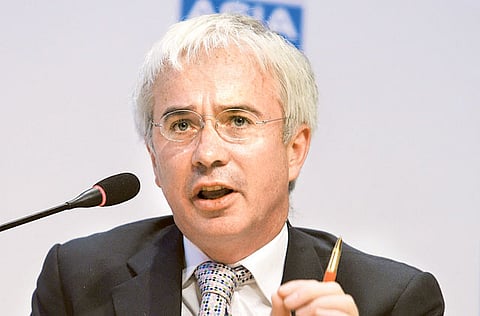UAE on a sustainable growth path, Standard Chartered Group CEO says
Businesses should guard against over-exuberance, Sands warns

Dubai: The UAE economy is growing at very healthy pace with the overall outlook very positive for sustainable growth over a long period, Peter Sands, group chief executive of Standard Chartered, told Gulf News in an interview.
“In the UAE in general and Dubai in particular, the business mood is very positive and the flow of economic data we see is very encouraging,” Sands said, adding: “Middle East is one of Standard Chartered’s top five global markets and the UAE accounts for a large chunk of our business in the region.”
With leading emerging markets where it operates facing economic slowdown and relatively modest growth in the US and nascent recovery in Europe, Sands expects opportunities in the Middle East and Africa to be the major driver of the bank’s global business growth.
“With already high investments supporting economic growth and more to come as part of Expo 2020, the UAE and Dubai is certainly on a sustainable growth path and what everyone wants is that businesses don’t get over-exuberant and then face a correction,” Sands said.
Banking sector regulations
“We are comfortable with the banking sector regulations in the UAE, including the new regulatory measures such as the mortgage regulations and the exposure limits set for banks in lending to government-related entities,” he said.
The bank, a major player in global trade finance, has big stakes in the trade financing opportunities in Dubai. “One of the critical things we focus is on trade. Dubai being an important global trading hub, our operations here are very important for us and our customers,” Sands said.
The bank is also eyeing the deepening of the debt and equity capital markets within the UAE and the region as new opportunity. It wants to play a big role in the Islamic banking and Islamic capital markets activity in the region as Dubai seeks to become a global hub for Islamic finance and economic activities.
A number of international banks, including Standard Chartered, were affected by the spate of loan restructurings in the UAE and the rest of the GCC that followed the global financial crisis.
“We will continue to develop and invest in our businesses through the ups and downs. We are going to be here in the good times and bad times. What we see is that people have learnt some important lessons from the difficult times and expect that these lessons will be guiding all of us,” he said.
Regional expansion
The bank is expanding its presence in both Middle East and Africa. In the Middle East, it opened its first Iraq branch in Baghdad last November. Next month, it will open a branch in Erbil, the capital of the autonomous Kurdistan region of Iraq.
In Africa, the bank is present in 14 countries in sub-Saharan Africa. “We have consistently grown and invested in our African franchise and we see huge opportunities there. We have just opened in Angola,” Sands said.
Sign up for the Daily Briefing
Get the latest news and updates straight to your inbox



